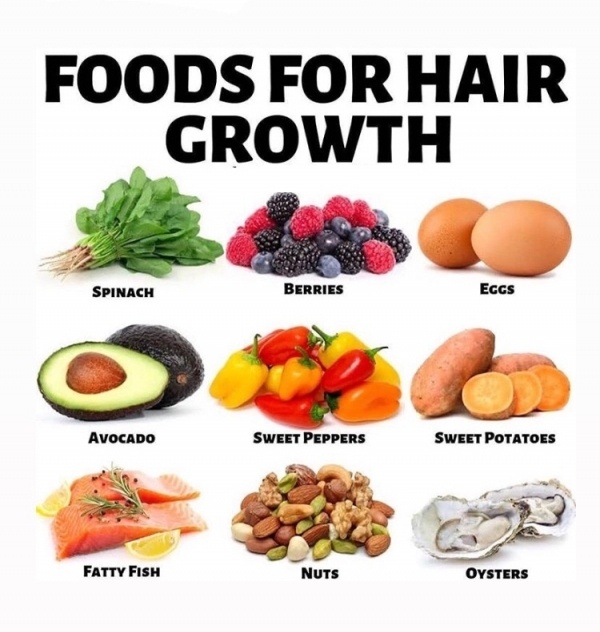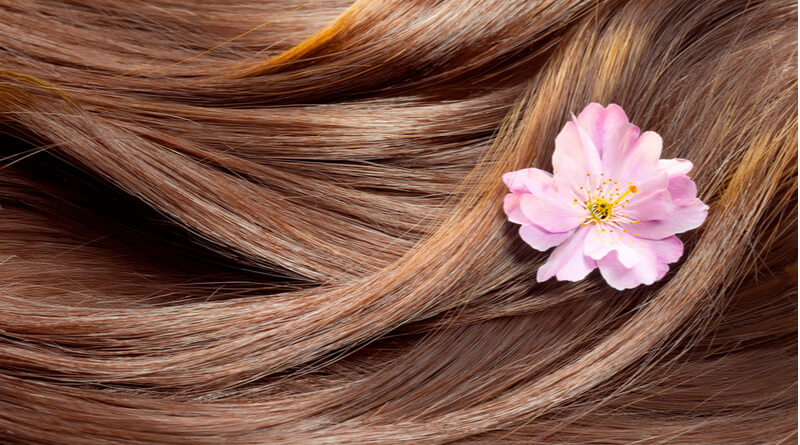Table Of Content

Enjoy 20 full grams of protein when you eat just one 3 oz serving of tuna (i.e. 1/4 of a 12 oz can of tuna or a 3 oz steak). Protein is an essential food for hair growth, and canned tuna is a convienent protein source to keep on hand. Gorin likes to add chickpeas to her plate, especially since one cup has 15 grams of plant-based protein, necessary for growing long and strong hair. "Additionally, chickpeas contain fiber — and the combo of protein and fiber nutrients can help keep you fuller for longer and help to keep your blood sugar levels stable," she says. Childbirth, stress, thyroid conditions, and a health issue called alopecia can cause more sudden loss of hair.
Best for Brittle Strands
Although reducing your stress levels might seem insurmountable, making sure you’re eating the right things will go a long way to setting a good foundation for optimum hair growth. A healthy balanced diet is also important in stress reduction too as it can support a healthy immune system, repair damaged cells and even reduce elevated cortisol levels. Getting enough protein in your diet is essential as it provides the building blocks for proper hair growth; meat, tofu, eggs, beans, grains, nuts, and fish are all good protein sources. Some studies suggest that telogen effluvium can also be connected to low levels of iron, so include iron-rich foods like leafy vegetables, lentils and liver where you can. If you like the idea of adding supplements to your routine, there are some which are specifically formulated to contain ingredients that increase hair thickness and health.
Red Meat
The researchers from the above study suggest that treatments can be once a month, for 3 months, and every 6 months thereafter for maintenance. Sudden weight loss may also cause temporary shedding, known as telogen effluvium (TE), or diffuse alopecia. Madeleine, Prevention’s assistant editor, has a history with health writing from her experience as an editorial assistant at WebMD, and from her personal research at university. She graduated from the University of Michigan with a degree in biopsychology, cognition, and neuroscience—and she helps strategize for success across Prevention’s social media platforms.

Avocados for healthy fats and vitamin E
She holds a bachelor’s degree in nutritional sciences from Pennsylvania State University and a master’s degree in clinical nutrition from NYU. She is also Good Housekeeping’s on-staff fitness and exercise expert. Stefani is dedicated to providing readers with evidence-based content to encourage informed food choices and healthy living. She is an avid CrossFitter and a passionate home cook who loves spending time with her big fit Greek family.
Vitamin D

A 3-ounce serving of beef liver covers 31% of your daily iron needs and makes a smart choice for people with low iron levels. Beef liver is also rich in protein, copper, zinc, B12, and selenium, all of which help promote healthy hair growth. To determine the best foods for hair growth and hair health, it's helpful to know which vitamins and nutrients are important for the hair growth process. For example, consuming foods high in vitamin C, E, D, biotin, and zinc all play a role in hair growth. That being said, we wanted to get specific on what we can incorporate into our diet to get the locks of our dreams, so we tapped nutritionists and dietitians in addition to St. Surin-Lord. A lack of proper nutrients, including vitamins A, C, D, and E, zinc, B vitamins, iron, biotin, protein, and essential fatty acids, may slow hair growth or cause hair loss.
7 best food for hair growth - Mint
7 best food for hair growth.
Posted: Thu, 29 Feb 2024 08:00:00 GMT [source]
Adding a sprinkle to your salads or eating a handful for a snack offers biotin and plenty of plant-based protein. Greek yogurt also has an ingredient that helps with blood flow to your scalp and hair growth. It’s called vitamin B5 (known as pantothenic acid) and may even help against hair thinning and loss. You may recognize pantothenic acid as an ingredient on your hair and skincare product labels. Hair follicles are made up of protein, so it makes sense that eating protein is a great way to support hair growth. If you're looking for a vegetarian alternative to animal proteins, try pulses (the dry, edible seeds of veggies) like chickpeas, lentils, beans and peas.
The recommended upper limit for selenium in adults is 400 micrograms (mcg). Brazil nuts are very rich in selenium — one brazil nut offers 68–91 mcg — so people may wish to limit their intake to around four Brazil nuts per day. Authors of a scientific review note that selenium is involved in creating hair. They report that newly forming hair takes up selenium after receiving trace elements from the blood. Certain evidence suggests that the right nutrients can aid in healthy, strong and shiny strands. Vitamin A is an antioxidant that regulates cell turnover and oil production.
How does diet impact hair growth?
However, the quality, quantity, and growth of hair are also closely linked to the diet. A diet that is deficient in specific nutrients can lead to hair loss. Hair growth refers to sprouting new follicles, which lie underneath your skin.
5 foods to boost keratin levels for hair growth - Hindustan Times
5 foods to boost keratin levels for hair growth.
Posted: Wed, 17 Apr 2024 07:00:00 GMT [source]
“Collagen is essential for hair structure and growth, and vitamin C is vital for collagen production,” Dr. Henry concurs, noting that bell peppers are rich in vitamin C. Celebrity hairstylist Marc Mena points to avocado as one of his top choices, since the fruit contains vitamin A, B vitamins, vitamin C, vitamin D, vitamin E, iron, zinc, and biotin. “Biotin is often recommended for hair health and can be found in eggs, nuts, and whole grains,” Dr. Henry says. A 2017 study, published in Dermatology Practical & Conceptual, showed that the hair follicles of adults taking a spermidine-based nutritional supplement remained in their growth phase longer than those taking a placebo. Some people use herbal supplements to promote hair growth, though research has not confirmed that these remedies work.
Here, dermatologists share the best foods for hair growth you should be eating regularly. Excellent sources of plant-based protein, beans are also chock-full of hair-healthy plant compounds, iron, zinc, and biotin. From soups and stews to salsas and salads, the options for enjoying beans at home are truly endless.
It goes without saying that excessive heat and chemical treatments aren’t a good idea, but try and opt for protective hairstyles too. “Opt for hairstyles that minimize tension on the hair follicles, such as loose braids, buns or ponytails,” advises Gaboardi. “Avoid tight hairstyles and hair accessories that pull on the hair and handle your hair with care to minimise breakage and damage. There's no guarantee that the collagen you eat directly benefits areas such as skin or joint health, but foods that support collagen production are still generally recommended as part of a health-supporting eating plan.
Flaxseeds and chia seeds are good sources of omega-3 fatty acids, while sunflower seeds are chock full of vitamin E and iron. A nutritious diet with the recommended essential nutrients, including protein, antioxidants, iron, and fatty acids, can help support healthy hair growth. Avoiding deficiencies can help prevent hair loss due to a lack of nutrients.
Supplements may help, but it's far better to get the necessary nutrients naturally. If you want to focus on foods for healthy hair, here are 10 of the best. With scalp boosting vitamins A and C, along with keratin-producing biotin, this combo is sure to support healthy hair growth. Strawberries are an excellent source of vitamin C, says Keri Gans, M.S., R.D., registered dietitian and author of The Small Change Diet.
While it’s helpful to incorporate beneficial foods, try not to focus solely on a limited number of foods. Talking to your healthcare provider before changing your diet is a good idea. People with some hair loss disorders, including those with androgenetic alopecia, have been shown to have decreased antioxidant activity and higher levels of malondialdehyde in their blood. They're high in vitamin C—so much so that they contain triple the amount than oranges, with green peppers containing 95.7 mg, red peppers containing 152 mg, and yellow peppers containing an impressive 341 mg.
Valerie Agyeman (she/her) is a women's health dietitian and the host of the Flourish Heights podcast, where she produces science-driven content covering overlooked nutrition, wellness and women’s health topics. She has over 10 years of nutrition communications, corporate wellness and clinical nutrition experience. Valerie is a trusted expert and regularly appears on networks including ABC’s Good Morning Washington, and she is a contributing expert to publications like Women’s Health, The Thirty and Shape. One medium oyster provides up to 96% of daily zinc needs for females and 75% for males (27).

No comments:
Post a Comment